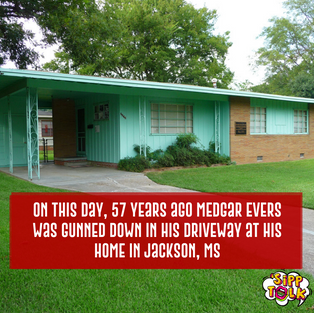Celebrating the Life of Medgar Evers
- Sipp Talk

- Jun 12, 2020
- 3 min read
Updated: Jan 19, 2021

On June 12, 1963, WWII veteran Medgar Evers was murdered in the driveway outside his home in Jackson, Mississippi.
As a field worker for the NAACP, Evers had traveled through his home state encouraging African Americans to register to vote. He was instrumental in getting witnesses and evidence for the Emmett Till murder case and others, which brought national attention to the terrorism used against African Americans.
Profile by Dernoral Davis. Reprinted from the Mississippi Historical Society, Mississippi History Now.
Between 1952 and 1963, Medgar Wiley Evers was one of Mississippi’s most impassioned activists, orators, and visionaries for change. He fought for equality and fought against brutality. Born July 2, 1925, in Decatur, Mississippi, Medgar was one of four children born to James and Jesse Evers. His father worked in a sawmill and his mother was a laundress. Evers’s childhood was typical in many ways of black youths who grew up in the Jim Crow South during the Great Depression of the 1930s and in the years preceding World War II. As a youth, Evers’s parents showered him with love and affection, taught him family values, and routinely disciplined him when needed. The Evers home emphasized education, religion, and hard work.
Among his siblings, Evers spent the most time with Charles, whom he idolized. As Evers’s older brother, Charles protected him, taught him to fish, swim, hunt, box, wrestle, and generally served as a sounding board for many of Medgar’s early experiences. He attended all-black schools in the dual and segregated public educational system of Newton County. Segregated public education meant long walks to school for the Evers children. The schools had few resources and operated with outdated textbooks, few teachers, large classes, and small classrooms without laboratories and supplies for the study of biology, chemistry, and physics.

Besides his under-funded public education, Evers on occasion saw and witnessed acts of raw violence against blacks. On these occasions, Evers’s parents and older brother could not shield him from the realities of a society built on racial discrimination. At about age 14, Evers observed to his horror the dragging of a black man, Willie Tingle, behind a wagon through the streets of Decatur. Tingle was later shot and hanged. A friend of Evers’ father, Tingle was accused of insulting a white woman.
Evers later recalled that Tingle’s bloody clothes remained in the field for months near the tree where he was hanged. Each day on his way to school Evers had to pass this tableau of violence. He never forgot the image.
A World War II Soldier
At the end of his sophomore year of high school and several months before his eighteenth birthday, Evers volunteered and was inducted into the United States Army in 1942. During his tour of duty in World War II, Evers was assigned to and served with a segregated port battalion, first in Great Britain and later in France. Though typical at the time, racial segregation in the military only served to anger Evers.

Roy Wilkins and Medgar Evers being arrested on June 1, 1963, in Jackson, Miss. Evers was murdered just 11 days later. Photo: Corbis Images.
By the end of the war, Evers was among a generation of black veterans committed to answering W.E.B. Du Bois’s clarion call of nearly three decades earlier: “to return [home] fighting” for change.
Upon returning home, the initial “fight” for Evers was to register to vote. For Evers voting was an affirmation of citizenship. Accordingly, in the summer of 1946, along with his brother, Charles, and several other black veterans, Evers registered to vote at the Decatur city hall. But on election day, the veterans were prevented by angry whites from casting their ballots. The experience only deepened Evers’s conviction that the status quo in Mississippi had to change. Continue reading.
*Republished from The Zinn Education Project




















Comments